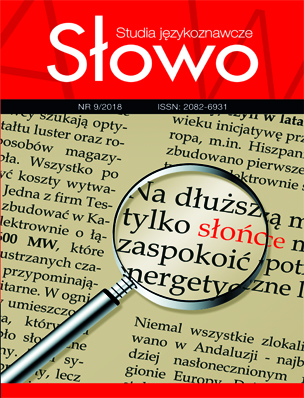Wiejskie dziecko w języku i kulturze
DOI:
https://doi.org/10.15584/slowo.2018.9.18Słowa kluczowe:
linguistic worldview, child in folk, cognitive definition, child in a peasant familyAbstrakt
The purpose of the article is representation of linguo-cultural view of child in of the Lasowiaks’ and Rzeszowiaks’ culture. The basis of the research are selected monographic works of Aleksander Saloni, Oskar Kolberg and Franciszek Kotula. In the reconstruction of the linguistic and cultural image of the child was applied the cognitive method by Jerzy Bartmiński. The analysis shows categories separated on the basis of the collected material. In each category (for example: appearance, features, attributes and actions) have been distinguished subcategories. The analysis presents which attributes creating the prototypical representation of a child in folklore. The analysis let us deduct that in a folk image: a child was the God’s gift; unlike the parents, a child is particular sensitive to an illness or the magic activities; the background of the child defines its status and future (child conceived in marriage had a better futurity); the negative features are those that dominate in the case of a child (for example: crying, sick, hungry, immature). The article indicates a part of a wide specter of my research from my master thesis which is entitled: The Lingustic Representation of family in the folklore of the Lasowiaks and Rzeszowiaks.Downloads
Bibliografia
Fedyczkowska E., 2008, Pieśni Lasowiaków. Folklor lokalny terenów dawnej Puszczy Sandomierskiej na podstawie archiwalnych nagrań Franciszka Kotuli, Rzeszów.
Kolberg O., 1961, Pieśni ludu polskiego, t. 1, Kraków.
Kolberg O., 1967, Lud. Jego zwyczaje, sposób życia, mowa, podania, przysłowia, obrzędy, gusła, zabawy, pieśni, muzyka i tańce, Tarnowsko-Rzeszowskie, t. 48, Warszawa.
Kolberg O., 1977, Przysłowia, wyd. 2, Warszawa.
Kotula F., 1956, Powieści ludu rzeszowskiego, Kraków.
Kotula F., 1962, Z Sandomierskiej Puszczy. Gawędy kulturalno-obyczajowe, Kraków.
Kotula F., 1969, Folklor słowny osobliwy Lasowiaków, Rzeszowiaków i Podgórzan, Lublin.
Kotula F., 1970, Hej, leluja, czyli o wygasających starodawnych pieśniach kolędniczych w Rzeszowskiem, Warszawa.
Kotula F., 1974, Po Rzeszowskim Podgórzu błądząc. Reportaż historyczny, Kraków.
Kotula F., 1976, Znaki przeszłości. Odchodzące ślady zatrzymać w pamięci, Warszawa.
Kotula F., 1979, Muzykanty, Warszawa.
Kotula F., 1983, U źródeł, Rzeszów.
Kotula F., 1988, Pojedynek z diabłem, Rzeszów.
Kotula F., 1989, Przeciw urokom. Wierzenia i obrzędy u Podgórzan, Rzeszowiaków, Lasowiaków, Warszawa.
Saloni A., 1903, Lud łańcucki, „Materiały Antropologiczno-Archeologiczne i Etnograficzne” t. 6, Kraków.
Saloni A., 1908, Lud rzeszowski, „Materiały Antropologiczno-Archeologiczne i Etnograficzne” t. 10, Kraków.
Bartmiński J. (red.), 2007a, O pojęciu językowego obrazu świata [w:] Językowe podstawy obrazu świata, Lublin, s. 11–21.
Bartmiński J. (red.), 2007b, Definicja kognitywna jako narzędzie opisu konotacji [w:] Językowe podstawy obrazu świata, Lublin, s. 42–51.
Bednarski H. (red.), 1984, Rodzina wiejska w świetle aktualnych badań, Bydgoszcz.
Bukraba-Rylska I., 2013, Socjologia wsi polskiej, Warszawa.
Chałasiński J., 1938, Społeczne podłoże ruchów młodzieży wiejskiej [w:] Socjologia wsi i rolnictwa. Wybór tekstów, oprac. J. Styk, Lublin 1987, s. 170–193.
Gałaj D., 1984, O nie docenianej sprzeczności w przeobrażeniach społeczności chłopskiej [w:] Socjologia wsi i rolnictwa. Wybór tekstów, oprac. J. Styk, Lublin 1987, s. 46–53.
Juchcińska-Giłka K., 2012, Dzieciństwo na wsi polskiej w okresie Drugiej Rzeczypospolitej w świetle źródeł pamiętnikarskich, „Przegląd Pedagogiczny”, z. 1, s. 224–234.
Kowalski P., 2007, Kultura magiczna. Omen, przesąd, znaczenie, Warszawa.
Markowska D., 1970, Rodzina wiejska na Podlasiu, Wrocław.
Markowska D., 1976, Rodzina w społeczności wiejskiej – ciągłość i zmiana, Warszawa.
Nawrot-Borowska M., 2011, Zabawy dzieci na wsi polskiej w II połowie XIX i na początku XX wieku w świetle literatury pamiętnikarskiej, „Przegląd Pedagogiczny”, z. 2, s. 39–64.
Styk J., 1990, Chłopskie wartości podstawowe. Dynamika i kierunki przeobrażeń [w:] Wartości a struktura społeczna, red. S. Marczuk, Rzeszów, s. 139–157.
Styk J., 1995, Chłopskie wzory zachowań publicznych i prywatnych [w:] Stare i nowe struktury społeczne w Polsce, t. 2: Wieś, red. I. Machaj, J. Styk, Lublin, s. 21–27.
Styk J., 1999, Chłopi i wieś polska w perspektywie socjologicznej i historycznej, Lublin.
Szlendak T., 2012, Socjologia rodziny. Ewolucja, historia, zróżnicowanie, Warszawa.
Thomas W., Znaniecki F., 1976, Chłop polski w Europie i Ameryce, t. 1: Organizacja grupy pierwotnej, Warszawa.
Tworek B., 1995, Świadomość zdrowotna ludności wiejskiej [w:] Stare i nowe struktury społeczne w Polsce, t. 2: Wieś, red. I. Machaj, J. Styk, Lublin, s. 61–67.
Tyszka Z., 1979, Socjologia rodziny, Warszawa.
Wawrzyniak B., 1980, Kobieta wiejska, Warszawa.
Pobrania
Opublikowane
Jak cytować
Numer
Dział
Licencja
Prawa autorskie (c) 2018 Słowo. Studia językoznawcze

Utwór dostępny jest na licencji Creative Commons Uznanie autorstwa – Użycie niekomercyjne 4.0 Międzynarodowe.


